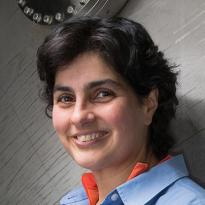Dean, School of Science

Biography
Nergis Mavalvala is an award-winning physicist and a pioneer in the detection of gravitational waves and of quantum measurement science. She is a longtime member of the scientific team behind the Laser Interferometer Gravitational-Wave Observatory (LIGO), which in 2016 detected the gravitational waves resulting from colliding black holes. With her doctoral adviser, Rainer Weiss, she helped to develop the gravitational-wave detector technologies that are at the heart of LIGO, which enabled the scientific discoveries that earned Weiss and his colleagues the 2017 Nobel Prize in physics.
The LIGO discovery—ripples in the space-time fabric caused by the motion of black holes and neutron stars—has been widely hailed as the dawn of a new era in astrophysics, allowing researchers to observe objects in the universe that are not visible with light. Thus, Mavalvala’s research has been instrumental in capturing the witheringly faint warping and rippling of the very structure of space-time to observe violent cosmic events. To further this research, she has conducted experiments on generation and application of exotic quantum states of light as well as on laser cooling and trapping of macroscopic objects to enable observation of quantum phenomena in human-scale systems.
For her groundbreaking research and her role in achieving the LIGO discoveries, Mavalvala has received numerous awards and recognitions, including a Sloan Foundation Fellowship (2005), a MacArthur Fellowship (2010), the Gruber Prize in Cosmology (2016), and the Carnegie Corporation’s Great Immigrant Award (2017). Mavalvala, who has been an outspoken voice for equality and women’s access to education, is a dedicated mentor and a highly visible role model for the LGBTQ+ community. In 2014, she was honored as the LGBTQ Scientist of the Year by the National Organization of Gay and Lesbian Scientists and Technical Professionals. She is a fellow of the American Physical Society and an elected member of the National Academy of Sciences.